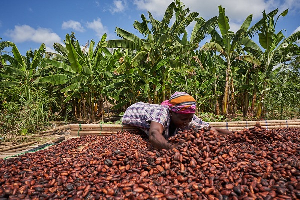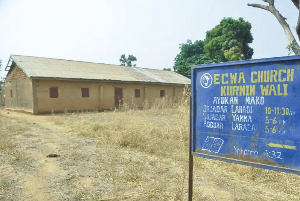Accra, Feb. 14, GNA - Members of the European Union have begun ratifying a Joint Strategy for Africa adopted last December to be implemented through series of action plans in eight key policy priority areas.
The Joint Strategy provides a shift from the individual member partnership arrangements with African countries to a collective form of partnership with Africa to handle multiple dimension of relationship in an integrated manner.
Briefing the media on the new EU-Africa Strategic Partnership on Wednesday Mr. Pierre Jacquemot, the French Ambassador to Ghana said the first action plan of the Joint Strategy structured around the eight areas add value to existing cooperation.
The eight areas include, peace and security, democratic governance and human rights, trade and regional integration, Millennium Development Goals, energy, climate change, migration, mobility and employment and science, information and space.
Mr Jacquemot said the implementation would be supported by existing financial instruments and by the EU financial institutions. In 2006, Ghana received budgetary support for road infrastructure and rural development which was over 600 million dollars.
This year, the Union together with European Commission was committing over 700 million dollars to Ghana representing about 50 per cent of all donor support from the country's development partners.
Explaining the implementation mechanism of Joint Strategy, Mr. Jacquemot said in order to promote African ownership of the process in the implementation of the selected priority areas, Africa would establish an institutional architecture and implementation mechanism that would reflect the ambition and drive behind the partnership. Some of the mechanisms he mentioned were; establishing more contacts between presidents of EU and AU institutions, mapping of an existing European and African civil society networks and hold an EU summit to review the results of the first action plan. Mr Filiberto Sebregondi, Head of the EU delegation in Ghana, speaking on EU bilateral relations with Ghana said the Economic Partnership Agreement (EPA) process was ongoing and that Ghana and Cote d'Ivoire who signed the interim agreement were expected to reach full EPA in 2009.
He said the EPAs basically covered a set of agreements on reciprocal market access between the EU and countries in Africa, Caribbean and the Pacific (ACP).
Mr Sebregondi said the EPA would strengthen regional integration and bring genuine development to African countries. According to him, the agreement was better than the status quo under Cotonou Partnership Agreement as it contained more favourable rules of origin, which would boost the local industry. "It is a 100 per cent market access offer, quota free and duty free by the European Union," he said.
General News of Thursday, 14 February 2008
Source: GNA












